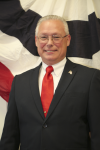Philip Wise, pastor of First Baptist Church, Dothan, was among 13 Baptists from the Baptist World Alliance (BWA) who met with representatives from the Roman Catholic Church’s Pontifical Council for Promoting Christian Unity Dec. 2-3 in the Vatican.
The delegation was led by Tony Cupit, the BWA’s director of study and research.
Wise, a vice president of the North American Baptist Fellowship, and James Leo Garrett, professor emeritus at Southwestern Baptist Theological Seminary in Fort Worth, Texas, represented the Southern Baptist Convention at the meeting.
The talks were the first since a five-year theological conversation between the two groups concluded in 1988.
They were scheduled at the suggestion of Brazilian pastor Nilson Fanini, now the BWA’s immediate past president, when he and Denton Lotz, the BWA’s general secretary, met with the Pontifical Council in 1999.
The meeting was made more critical by the release of a controversial document by the Roman Catholic Church’s Congregation for the Doctrine of the Faith last fall. The document, called “Dominus Iesus,” received widespread attention by the media, theologians and religious bodies around the world. Issued as an attempt to address pluralistic trends in the Roman Catholic church, it contains an article that has proven offensive to other Christian bodies, seeming to dismiss many of them by saying they “are not churches in the proper sense.” That kind of language seemed to be a regression to pre-Vatican II language and theology.
Dominus Iesus was a major focus of the meetings between the representatives of the BWA and the Pontifical Council for Promoting Christian Unity The Baptist delegation expressed their objections to the language contained in the section titled “Unicity and Unity of the Church” while affirming their agreement on the dangers of pluralism, secularism and relativism, which are addressed in the other sections of the document.
The Roman Catholic delegation made clear that this statement does not invalidate previous statements on ecumenism and assured the BWA delegation of their desire, and the desire of the pope, for official conversations with Baptists.
In December, members of the delegation met with representatives of the Italian Baptist Union, which had declined to send representatives to the meeting with the Roman Catholics. The concerns of the Italian Baptists were discussed and the meeting ended with encouragement from the Italian Baptists for the BWA to continue meeting with representatives from the Pontifical Council.
Although no official theological discussions were scheduled, both delegations agreed to meet again in 2001 to discuss specific issues raised in that meeting and in previous conversations. The meeting is part of the work of the BWA’s Commission on Doctrine and Inter-Church Relations. In addition to earlier conversations with Roman Catholics other conversations have been held with the World Alliance of Reformed Churches, the Lutheran World Federation and the Mennonite World Council. A new five-year conversation with Anglicans was launched in Norwich, England, in September last year. (BP)




Share with others: